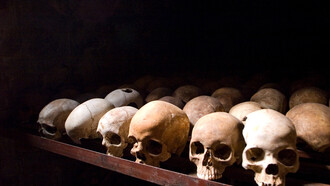Throughout history, Chile and Argentina have experienced moments of tension due to territorial disputes. They came to the brink of war in 1978, when both countries were ruled by military dictatorships that maintained concentration camps that tortured, disappeared, and murdered its inhabitants. At the same time, both governments cultivated nationalism, exalting the love of country, family and God. Faced with the prospect of a war in which neither country would have emerged victorious, Vatican diplomacy was called upon, which, with the wisdom and good judgement of its diplomatic negotiators, led to the signing of the Treaty of Peace and Friendship in Vatican City on 29 November 1984, now 40 years old.
While in Chile the dictatorship of Augusto Pinochet continued, in Argentina democracy had returned after the defeat suffered at the hands of the United Kingdom over the occupation of the Malvinas Islands. These latter facts undoubtedly made it easier to reach an agreement that would protect the interests of both countries, since the existing nationalist sectors had been defeated. The legacy of the military dictatorships is different.
In Argentina, the military were tried and convicted for crimes and human rights violations and returned to the place they should never have left: the barracks. In Chile, Pinochet and the military retained a high degree of power. After the dictator's arrest in London, the Chilean government rescued him from the hands of the courts and brought him back to the country, where he died without a conviction. In addition, the Pinochetist culture in the armed forces established a doctrine that remains in force to this day.
The 40th anniversary of the signing of the Treaty of Peace and Friendship has been rightly highlighted, but equally or more significant is the fact that two countries that became independent republics more than 200 years ago and that share one of the longest borders in the world have never fought a war and no Chilean or Argentinean soldier has ever shed blood. On the contrary, the armies of both countries jointly and definitively defeated the troops of the Spanish Empire in 1818, led by General José de San Martín, and then contributed to the liberation of Peru in 1820, under the Liberation Squadron organised by General Bernardo O'Higgins.
The fact that there has never been a war is a precious heritage that should be highlighted and preserved as a true example of peaceful coexistence and friendship between peoples with a common history. The commemoration of the Treaty of Peace and Friendship should ignore the deep political differences between the governments of Gabriel Boric and Javier Milei. We must highlight what unites us and not allow militarist and nationalist sectors to stimulate aggressive discourses that seek division, raise false threats, and stimulate military spending.
Political and security dialogue must guarantee the peace of nations whose future greatness depends to a considerable extent on cooperation on strategic issues. Chile's presence in the Asia-Pacific and Argentina's in the Atlantic could make us bioceanic countries in practice, if we manage to identify issues of national interest for both countries, such as cooperation in Antarctica, where the future expects both nations to cooperate rather than compete individually in a continent where the great powers will have the last word.
Chile and Argentina can be an example for the region and the world, in a continent where wars over territorial disputes are a thing of the past, unlike what is happening in Europe, where the two world wars of the twentieth century have been joined by those of Yugoslavia, Kosovo—and today, Ukraine and Russia are not giving peace to the continent, threatening global security.















